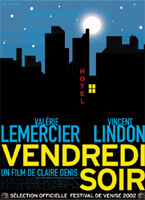 Because she shoots on the streets and in the apartments of Paris or on the plains and deserts of Africa, Claire Denis is sometimes thought of as "capturing" images with her camera. Or, if not operating on that level of realism, of at least as functioning in a contemporary milieu within an aura of "normalcy."
Because she shoots on the streets and in the apartments of Paris or on the plains and deserts of Africa, Claire Denis is sometimes thought of as "capturing" images with her camera. Or, if not operating on that level of realism, of at least as functioning in a contemporary milieu within an aura of "normalcy."But Denis’s camera doesn’t capture anything. It creates all, for Denis is the truest descendent of Josef von Sternberg and Jean Cocteau working today. Her films – never more so than her latest, Friday Night (Vendredi Soir) – translate light, color, shade, hue, tone and sound directly into emotion. These works are total artifice in pursuit of total truth. Even the pure motion of the plot is motivated as much by action as by the scourge of psychology. In what can only be a deliberate reference, Denis invokes Cocteau’s Orphée, the modern version of the Orpheus myth in which the poet listens to his muse over his car radio. The heroine of Friday night, a young woman stuck in a traffic jam, hears a traffic reporter on her car radio encouraging motorists to offer pedestrians a ride. The woman gives a lift to the first man she sees, a man who becomes her lover for the night.
Even when Denis stumbles, one can only note the failure of such a misfire as Trouble Every Day within the context of a larger, ever more enterprise that began with Chocolat and builds through I Can’t Sleep and Beau Travail.
Friday Night arrives cloaked deceptively as a "little film." On a Friday evening, Parisian Laure (Valérie Lemercier) packs up her things so she can move from her flat and into the apartment she will share with her boyfriend. The brief introduction is masterful, a beautiful encapsulation of Denis’s technique.
As evening falls, we see what at first look like the usual shots of Paris at night, the rooftops and cathedrals in gathering dusk and darkness, or floodlit. But Denis’s camera lends these clichéd images a dreamy quality so that their familiarity is ghostly, altered, imbued with both a sense of the past and a foreboding. The score is quiet and insinuating, almost a lullaby but somehow quietly arousing at the same time. Again, as is usual, the editing gradually hones in on a neighborhood, a street, a window, an interior: Laure’s apartment, where she packs her cartons in yellow light.
By this time the music has stopped and the main sound we hear is that of empty coat hangers clicking in the closet, a forlorn noise. Deciding what to keep and what to wear, Laure tries on a flashy red dress with a slit up the side, hesitates a minute and decides to keep it. Suddenly, we know everything. Still young, Laure knows she is leaving her real youth behind. But she does so reluctantly and will hold onto this sexy party dress as a talisman and a memorial of her past. Her boyfriend will have her in her present state, but the girl who danced and had lovers will remain private and her own.
In the middle of all this, Denis has cut to the building’s concierge, a middle-aged woman grumpily throwing out Laure’s rejects, rummaging through them and rescuing good clothes, and passing judgment on those who throw out wearable or salable items. Into the dream, a dose of the real.
This is extraordinary filmmaking and it doesn’t let up. Laure leaves her apartment, meets Jean (Vincent Lindon) after she gets into that massive traffic jam caused by a public transit strike, and still the magic continues. For once the immobility has done the job of getting the two lovers together, they suddenly find an exit from the mess that lands them in a strange, utterly unpopulated precinct of Paris.
There’s almost nothing more one can say about a film (adapted by Emmanuèle Bernheim from her own novel) which is so much one with the essence of its art. Powerful and true, Friday Night might find Denis on the eve of a major turn in her career.
